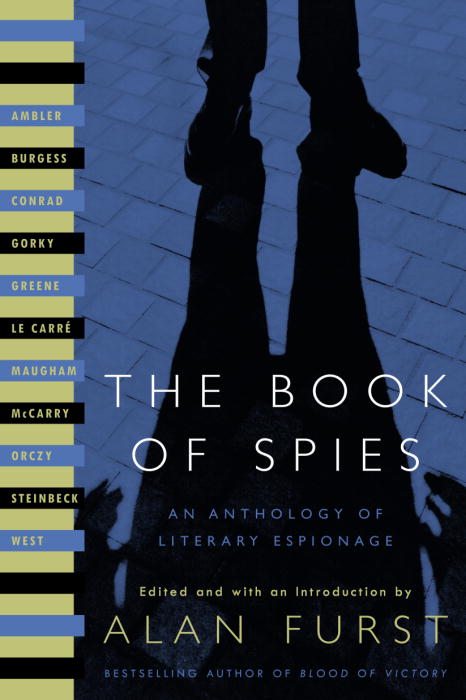Here is an extraordinary collection of work from some of the finest novelists of the twentieth century. Inspired by the politics of tyranny or war, each of these writers chose the base elements of spy fiction—highly evolved spy fiction—as the framework for a literary novel. Thus Alan Furst offers a diverse array of selections that combine raw excitement and intellectual sophistication in an expertly guided tour of the dark world of clandestine conflict.
These are not just stories of professional intelligence officers. We meet diplomats, political police, agents provocateurs, secret operatives, resistance fighters, and assassins—players in the Great Game, or victims of the Cold War. The Book of Spies brings us the aristocratic intrigues of The Scarlet Pimpernel, in which French émigrés duel with Robespierre’s secret service; the savage political realities of the 1930s in Eric Ambler’s classic A Coffin for Dimitrios; the ordinary citizens (well, almost) of John le Carré’s The Russia House, who are drawn into Cold War spy games; and the 1950s Vietnam of Graham Greene’s The Quiet American, with its portrait of American idealism and duplicity.
Drawing on acknowledged classics and rediscovered treasures, Alan Furst’s The Book of Spies delivers literate entertainment and excitement on every page.
-
Creators
-
Publisher
-
Release date
May 13, 2003 -
Formats
-
Kindle Book
-
OverDrive Read
- ISBN: 9781588363428
-
EPUB ebook
- ISBN: 9781588363428
- File size: 2087 KB
-
-
Languages
- English
-
Reviews
-
Library Journal
-
Booklist
May 1, 2003
Furst, one of our best modern espionage writers (" Kingdom of Shadows"), brings together selections from the work of some of the genre's founders and a few of its most celebrated practitioners. This being a Modern Library edition, the emphasis is on the literary side of spy fiction, so it's no surprise to find work by everybody's highbrow division Big Three--Conrad, Greene, and le Carre-- but even with the obvious authors, Furst shows some spirit in his selections. With le Carre, for example, we don't get the expected Smiley moment but, instead, are offered the marvelous opening from the less-known but superb " Russia House." Furst is very good, both in his introduction and in the blurbs that precede each selection, at pinpointing the influence on the genre of the various authors, especially such pioneers as Eric Ambler and W. Somerset Maugham, whose " Ashenden," excerpted here, is often considered to have paved the way for the disenchanted spies of Greene and others. A superior anthology for anyone interested in the roots of espionage fiction.(Reprinted with permission of Booklist, copyright 2003, American Library Association.) -
Library Journal
July 1, 2003
One look at any best seller list will remind reviewers, readers, and librarians of the popularity of the mystery, spy, or espionage novel. In this compilation of some of the greatest works of espionage literature, Furst, a widely recognized espionage writer (e.g., Kingdom of Shadows; Red Gold), reminds readers in the introduction, citing the Old Testament, that spying is one of the oldest professions known to humanity. This volume-which features work by such writers as Eric Ambler, Anthony Burgess, Joseph Conrad, Maxim Gorky, Graham Greene, John Steinbeck, and Rebecca West-doesn't break new ground, but it does place the genre in perspective, using it to explain human nature within history, national security, and the context of war. Furst used two standards for including writers in the anthology: five of the authors, having served in the intelligence services for their country, write from "practical, firsthand experience," while others had experience with living under or working in a particular political climate, where they learned to view the "world as a theatre of deception." This very literary look at a popular genre is recommended for all libraries with large collections of thrillers. [This anthology is published to coincide with the paperback release of Furst's 2002 best seller Blood of Victory.-Ed.]-Pam Kingsbury, Florence, ALCopyright 2003 Library Journal, LLC Used with permission.
-
Library Journal
June 15, 2003
One look at any best-sellers list will remind reviewers, readers, and librarians of the popularity of the espionage novel. In this compilation of some of the greatest works of espionage literature, Furst, a widely recognized espionage writer (e.g., Kingdom of Shadows; Red Gold), reminds readers in the introduction, citing the Old Testament, that spying is one of the oldest professions known to humanity. This volume-which features work by such writers as Eric Ambler, Anthony Burgess, Joseph Conrad, Maxim Gorky, Graham Greene, John Steinbeck, and Rebecca West-doesn't break new ground, but it does place the genre in perspective, using it to explain human nature within history, national security, and the context of war. Furst used two standards for including writers in the anthology: five of the authors, having served in the intelligence services for their country, write from "practical, firsthand experience," while others had experience with living under or working in a particular political climate where they learned to view the "world as a theatre of deception." This very literary look at a popular genre is recommended for all libraries with large collections of thrillers. [This anthology is published to coincide with the paperback release of Furst's 2002 best seller, Blood of Victory.-Ed.]-Pam Kingsbury, Florence, ALCopyright 2003 Library Journal, LLC Used with permission.
-
Formats
- Kindle Book
- OverDrive Read
- EPUB ebook
subjects
Languages
- English
Loading
Why is availability limited?
×Availability can change throughout the month based on the library's budget. You can still place a hold on the title, and your hold will be automatically filled as soon as the title is available again.
The Kindle Book format for this title is not supported on:
×Read-along ebook
×The OverDrive Read format of this ebook has professional narration that plays while you read in your browser. Learn more here.


